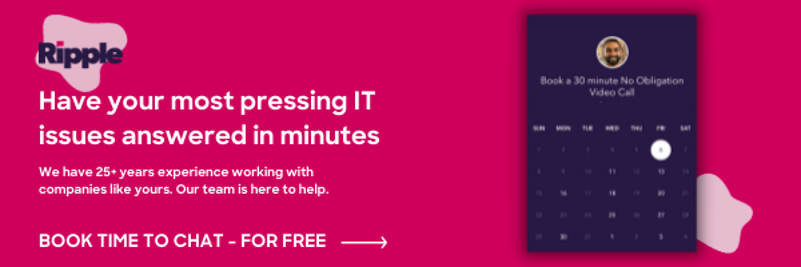
Since the pandemic began, a large portion of the workforce has transited to working remotely from home. And even once the pandemic fades and COVID-19 restrictions end, it’s likely that remote work will continue in a variety of industries, now that employees have grown to enjoy this new level of flexibility. What does this mean for business owners and office managers who normally had a physical, full office to look after? Though there are plenty of financial benefits of transitioning to a remote workforce, having your staff primarily work from home does come with new security risks.
The sudden shift to a remote workforce has left many businesses scrambling to establish new security protocols to mitigate this new wave of cybersecurity risks. If your company plans on maintaining a remote workforce for the foreseeable future, here are our 7 of our best practices to help protect your company and employees.
- Use the Cloud
- Antivirus Software
- Virtual Private Networks (VPNs)
- Multi-Factor Authentication
- Regular Updates
- Data Backups
- Employee Training
Make Sure That Your Employees Are Using The Cloud
One of the first things that you should do is migrate your business's applications to the cloud. Cloud applications like Office 365 provide a secure platform for your employees to do their work, as they are updated regularly with the latest security features, and they are compliant with industry regulations. Additionally, Office 365 makes it easier for your team to collaborate and work together from wherever they are, as it provides a simple, secure platform where employees can communicate, share documents, and work on projects together remotely.
If your company already relies on the cloud, it is critical that you make sure that all of your employees are storing projects they are working on, as well as other sensitive work documents. Make sure that your employees are aware of your company's cloud storage solution, and emphasize that it is a more secure option than storing company files locally on their devices.
Storing files this way reduces the risk to your company should one of your employees' devices be stolen, or fall prey to a cyberattack, as important documents will be protected by the firewall attached to your centralized cloud storage system.
Use Strong Antivirus Software
When trying to keep your company safe from a cyberattack of any kind, one of the most important preventative measures you can take is to invest in a high-quality antivirus and internet security program for you and your employees. Strong antivirus software will be your company's main defense against hackers, so it is critical that you make sure that this software is installed on all company devices as well as any personal devices remote employees may be using for work purposes. Don’t forget to keep this software up-to-date, as a strong internet security program can work in the background at all times to detect and neutralize potential threats.
Use a Virtual Private Network (VPN)
One of the most popular security tools for remote workers are Virtual Private Networks (VPNs), and if you have yet to set up a company VPN that employees have to log into for work, you should consider so immediately. VPNs are an extremely effective cybersecurity tool for companies maintaining a remote workforce, as they encrypt all of a user's internet traffic, making it unreadable to anyone who may intercept it. This greatly reduces the threat of a data breach, since a hacker would not be able to access any secure data they might manage to intercept.
Of course, strong password management is critical in order to ensure your VPN is effective. If employees use weak passwords, and/or they are not careful with how they store their passwords, your VPN likely won’t be as effective. This makes it essential that you implement strong password requirements and use tools like LastPass to help store these passwords company wide. Make sure that employees use complex, unique passwords that incorporate a mix of letters (both upper and lower case), numbers, and special characters. You should also require employees to change their company passwords, and in particular their VPN password, every 90 days as a best practice.
Require Multi-Factor Authentication
While having strong passwords is a critical component in maintaining your company's digital security, it often isn't enough anymore. Logging into company applications, or the company VPN, with just a username and password (known as single-step authentication) is no longer enough to prevent cyberattacks. Instead, you will want to require employees to use two-factor (or multi-factor) authentication to log on to all company systems and applications. Multi-factor authentication adds an additional layer of protection by requiring users to provide another form of authentication when logging into accounts in addition to their password. This can include inputting a code received via text or email, or the use of biometric authentication such as facial recognition or a fingerprint scan. While businesses are often hesitant to implement multi-factor authentication, as it can be a hassle for employees to have to wait for a code received by text message before they can log into the application they need, this additional layer of security is remarkably effective at preventing security breaches, and it is a must-have for keeping your business secure if you have remote workers.
Require Regular Updates
Let's face it, software and operating system updates can be a pain as they take time out of your day, and we have all been guilty of putting these updates off for as long as possible. However, these updates often provide security patches that prevent hackers from exploiting software vulnerabilities to hack into a user's device.
Make sure your employees perform all system and software updates as soon as they become available to ensure that your devices are properly protected. You should also ensure that your employees are aware of the important role these updates play in cybersecurity and that there is a procedure in place for ensuring all updates are performed regularly and in a timely manner. You will likely have the option to enable automatic updates on company devices, which will ensure that updates are performed as soon as possible when they become available, helping to protect your company from a potential security breach.
Backups Are Essential
It is also critical that you have a plan in place to ensure that you are performing regular backups of critical company data. Should your company fall prey to a cyberattack, having robust backups in place can help ensure that all hope isn't lost, as recent backups can help your company to get back up on its feet as quickly as possible. Ideally, you will want to have backups of all of your company's critical data stored in the cloud as well as onsite. Make sure that you have a system in place to ensure these backups are performed on a set schedule. At the bare minimum, you will want to back up your company's data at least once a week, however, more critical data should be backed up more frequently to help ensure as little as possible is lost should you fall prey to a cyberattack.
Provide Regular Training
The ideal scenario would be to prevent a cyberattack from happening in the first place and your staff is your first line of defense against hackers. If you rely on a primarily remote workforce, cybersecurity training is particularly important, as you will not be around to oversee your staff and remind them of steps they should be taking to keep company data secure.
For example, do your employees know what a phishing text or email looks like? Do they know not to click on links or download files in emails from unknown senders or on unsecured websites? Going over basic cybersecurity best practices is a simple yet effective way to prevent a data breach. If you do not have the resources to provide this training to your entire staff, you may want to consider partnering with a third party company that offers this kind of training.
As your company transitions to a remote workforce, it is critical that you take steps to enhance your cybersecurity so that your remote workers do not put your company at risk. Fortunately, you do not have to go through this transition alone. An IT managed service provider (MSP) can help you to develop and implement a security strategy that will greatly reduce your risk of falling prey to a cyberattack. Feel free to contact us to learn more about the steps that you should be taking to protect your company from a data breach as well as to learn about the benefits of outsourcing your company's IT needs to an MSP.
Don't Fall Behind!
Get the latest work-from-home and Humans First® IT tips straight to your inbox.
